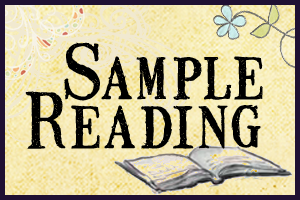TOPICS:
1) Read a book that has been made into a movie.
2) Read a book with an older Hero or heroine (AT LEAST mid-to-late thirties).
THEMES:
3) Read a novel that is classified as “chick-lit” or a light, humorous book about a young single, working woman in an urban setting.
4) Read a book that has a character that is involved in any type of arts (music, dance, literature, etc). <-- I chose this one.
SPECIAL EVENTS:
5) Read a book that features a “friendship” as its main storyline.
* * *

The Brentwood Twins have returned to England from Baltimore -- being the newest faces in town, they are the object of much attention. And a lot of that attention is unwanted -- because the Brentwood Twins closely resemble a man who is not their father.
The most audacious piece is a thinly-veiled parody written in the The Daily Herald titled, A Tale of Three Gentlemen written by renowned poet, Sir Phillip Crisp.
Iverson Brentwood is on damage control and has already "convinced" another writer, Lord Waldo, to stop writing about his family -- and he is not happy with the parody and what the parody implies. Iverson has decided to nip the proverbial bud by going directly to Sir Phillip's house to "convince" him not to publish any more.
Except Sir Phillip isn't home and hasn't been home in quite a while. Instead, Iverson meets Sir Phillip's daughter, Catalina.
In a house full of dreamers and "artistic sensibilities," Catalina has had to keep her feet firmly planted on the ground. She needs to -- her family is always one step from penury and financial ruin, she's had to juggle household accounts, merchants' bills along with having to deal with an alcohol-dependent aunt (her aunt calls it "tonic") and an unreliable father who is more often away than at home --
To make ends meet, Catalina has secretly been finishing her father's work for the past three years.
Now that she's met and spoken to Iverson, she realizes that, their "harmless" parody has actually caused harm to the subject of their parody -- and she needs to prevent the publication of the remaining parts of the piece.
Except the publisher doesn't want to deal with her -- and so Catalina must go search for her father.
Iverson is also looking for Sir Phillip -- and his path would often cross with Catalina's -- despite his feelings for Catalina's father, he grows to appreciate and love Catalina.
My biggest problem with this story is that I didn't like the heroine. I think I was supposed to sympathize with Catalina's plight, having to act the adult in a household where she is the youngest -- but I did not feel she was strong. Capable, yes. But, strong? No.
Her father takes her for granted (see his reaction to her finally standing up for herself in pp 296-298). Her aunt lives in her own world. And Catalina doesn't have the courage (or the will) to pull them back to reality. Instead, she allows them to live in their own fantasy.
"Oh there you are, Catalina," Aunt Elle said, entering the room. "This came this morning." She handed a piece of paper to Catalina. "It's from my apothecary. It appears we never took care of the man last month for my tonics. I don't know how that happened, dearest, as I know you are quite good with keeping up with everything that must be paid."
"I'm certain I handled this, Auntie." Catalina looked at the paper and was astounded by the amount. "Auntie, this isn't for last month. This is for something you picked up just last week. Did you need this much tonic?"
Aunt Elle's eyes widened with concern. "Yes, of course I did. You know how distressed I get when I don't have my medications in a timely fashion."
"Yes, yes, I know," Catalina quickly said, trying to hide her shock at the amount and not alarm her aunt. "It's not a problem." She smiled. "This is nothing for you to worry about. I'll take care of it."
- pp. 149-150
And there was this:
Catalina felt an overwhelming need to tell Iverson there were two more parts of A Tale of Three Gentlemen yet to be published.
He deserved to know.
But ...
Was it so wrong of her to hold out hope her father would return in time, so she wouldn't have to? Dare she hope he was at home, waiting for her right now?
She had no doubt if she told Iverson the truth he would never speak to her again. If she waited, and by some chance her father had made it home, Iverson would never have to know what she had kept from him.
- pp. 195-196
This is a rare thing for me to say but I didn't think the heroine deserved her happy ending -- she was an enabler: her aunt's a drunk and her father leaves for unknown periods of time and leaves her with his unfinished work, unpaid debts and very little money.
From the start, Cataline knew what Iverson wanted -- and she could have admitted that she had helped her father write the parody ... but she didn't. She let him believe her father was solely responsible. Granted, she did try to get back the unpublished portions of the parody -- but she didn't try hard enough.
And she never admitted her own culpability.
She was too busy flirting with Iverson. Too busy feeding her aunt's addiction. Too busy covering up for her father.
I almost didn't finish this story -- but I read on, hoping that the story would get better. Very disappointed with the direction this story took: there was no transformation and no admission of guilt with a promise to reform. The problem was never solved, just swept under the rug (see pp 305-306). Instead, those complicit are rewarded with a marriage to a family with deep pockets with Iverson now joining in the continued enabling of Catalina's family's problems . And that's what saddens me.
This is Book 5 in Amelia Grey's Rogue's Dynasty series. (I really enjoyed Book 4: A Gentleman Never Tells.) To find out more about Amelia Grey and her books, visit her website. She's also on Facebook.























